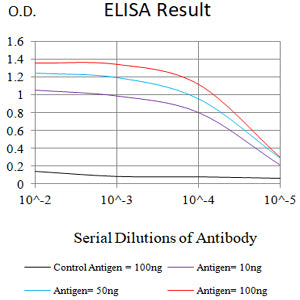
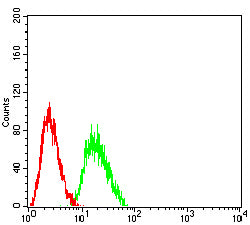
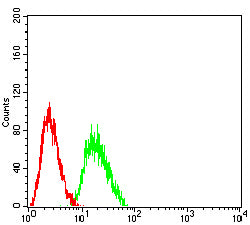
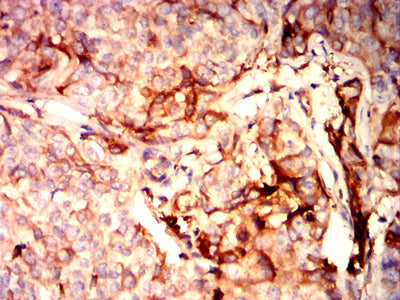
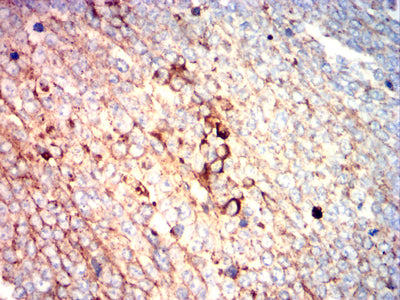
| WB | 咨询技术 | Human,Mouse,Rat |
| IF | 咨询技术 | Human,Mouse,Rat |
| IHC | 1/200-1/1000 | Human,Mouse,Rat |
| ICC | 技术咨询 | Human,Mouse,Rat |
| FCM | 1/200-1/400 | Human,Mouse,Rat |
| Elisa | 1/10000 | Human,Mouse,Rat |
| Aliases | PI; A1A; AAT; PI1; A1AT; nNIF; PRO2275; alpha1AT |
| Entrez GeneID | 5265 |
| clone | 7D3A2 |
| WB Predicted band size | 46.7kDa |
| Host/Isotype | Mouse IgG1 |
| Antibody Type | Primary antibody |
| Storage | Store at 4°C short term. Aliquot and store at -20°C long term. Avoid freeze/thaw cycles. |
| Species Reactivity | Human |
| Immunogen | Purified recombinant fragment of human SERPINA (AA: 269-419) expressed in E. Coli. |
| Formulation | Purified antibody in PBS with 0.05% sodium azide |
+ +
以下是3篇与SERPINA抗体相关的研究文献摘要,供参考:
---
1. **文献名称**: *Autoantibodies against SerpinA1 in chronic obstructive pulmonary disease*
**作者**: Talwar H, et al.
**摘要**: 该研究发现COPD患者血清中抗SERPINA1(α1-抗胰蛋白酶)的自身抗体水平显著升高,且与肺功能下降相关。研究提示这些抗体可能通过干扰蛋白酶-抗蛋白酶平衡参与疾病进展。
---
2. **文献名称**: *Anti-SERPINA3 antibodies as a novel biomarker in Alzheimer's disease*
**作者**: Smith C, et al.
**摘要**: 研究首次报道阿尔茨海默病患者脑脊液中存在抗SERPINA3(α1-抗糜蛋白酶)的自身抗体。实验表明这些抗体可能通过破坏血脑屏障功能,促进淀粉样蛋白沉积,提示其作为神经炎症标志物的潜力。
---
3. **文献名称**: *SERPINA5 autoantibodies in hepatocellular carcinoma*
**作者**: Li Y, et al.
**摘要**: 通过蛋白质组学筛选发现,肝细胞癌患者中抗SERPINA5(蛋白酶抑制素5)的自身抗体显著高表达,并与肿瘤侵袭性相关。机制研究表明这些抗体可能通过调控凝血通路促进转移。
---
**备注**:SERPINA家族包含多个成员(如SERPINA1、A3、A5等),其抗体在不同疾病中的产生机制和功能差异较大,建议根据具体研究方向筛选文献。如需全文链接或补充年份/期刊信息,可进一步说明。
SERPINA antibodies target members of the SERPINA protein family, a subgroup of serine protease inhibitors critical for regulating protease activity in biological processes. The SERPINA family, notably SERPINA1 (α1-antitrypsin, AAT), SERPINA3 (α1-antichymotrypsin), and SERPINA5 (protein C inhibitor), plays essential roles in controlling inflammation, coagulation, and tissue remodeling by inhibiting proteases like neutrophil elastase, cathepsin G, and thrombin. SERPINA1. the most studied member, is primarily synthesized in the liver and protects lung tissue from enzymatic damage. Mutations in the SERPINA1 gene cause alpha-1 antitrypsin deficiency (AATD), leading to emphysema and liver disease due to uncontrolled protease activity and protein aggregation.
Antibodies against SERPINA proteins are widely used in research and diagnostics. For example, SERPINA1 antibodies help quantify AAT levels in serum to diagnose AATD or monitor therapeutic interventions like AAT augmentation therapy. SERPINA3 antibodies are employed in studying Alzheimer's disease and cancer, as elevated SERPINA3 correlates with amyloid plaque formation and tumor progression. Autoantibodies against SERPINA proteins have also been implicated in autoimmune conditions, such as anti-SERPINA1 antibodies in vasculitis. Their roles in disease mechanisms and therapeutic targeting make SERPINA antibodies vital tools for understanding protease-imbalance-related pathologies and developing biomarker-driven treatments.
×